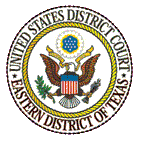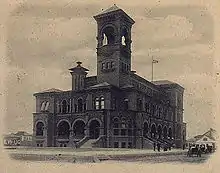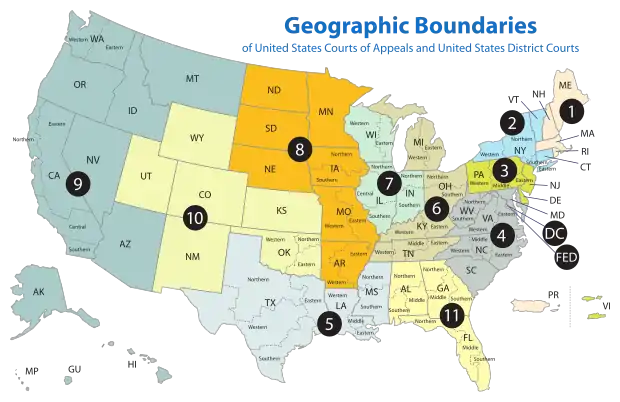United States District Court for the Eastern District of Texas
The United States District Court for the Eastern District of Texas (in case citations, E.D. Tex.) is a federal court in the Fifth Circuit (except for patent claims and claims against the U.S. government under the Tucker Act, which are appealed to the Federal Circuit).
| United States District Court for the Eastern District of Texas | |
|---|---|
| (E.D. Tex.) | |
 | |
| Location | William M. Steger Federal Building and U.S. Courthouse (Tyler) |
| Appeals to | Fifth Circuit |
| Established | February 21, 1857 |
| Judges | 8 |
| Chief Judge | James Rodney Gilstrap |
| Officers of the court | |
| U.S. Attorney | Nicholas Ganjei (acting) |
| U.S. Marshal | John M. Garrison |
| www | |
The District was established on February 21, 1857, with the division of the state into an Eastern and Western District.[1]
Organization of the court
The United States District Court for the Eastern District of Texas is one of four federal judicial districts in Texas.[2] Court for the District is held at Beaumont, Lufkin, Marshall, Plano, Sherman, Texarkana, and Tyler.
Beaumont Division comprises the following counties: Hardin, Jasper, Jefferson, Liberty, Newton, and Orange.
Lufkin Division comprises the following counties: Angelina, Houston, Nacogdoches, Polk, Sabine, San Augustine, Shelby, Trinity, and Tyler.
Marshall Division comprises the following counties: Camp, Cass, Harrison, Marion, Morris, and Upshur.
Sherman Division comprises the following counties: Collin, Cooke, Delta, Denton, Fannin, Grayson, Hopkins, and Lamar.
Texarkana Division comprises the following counties: Bowie, Franklin, Red River, and Titus.
Tyler Division comprises the following counties: Anderson, Cherokee, Gregg, Henderson, Panola, Rains, Rusk, Smith, Van Zandt, and Wood.
The United States Attorney's Office for the Eastern District of Texas represents the United States in civil and criminal litigation in the court. As of January 20, 2021 the Acting United States Attorney is Nicholas Ganjei.
History


The first federal judge in Texas was John C. Watrous, who was appointed on May 26, 1846, and had previously served as Attorney General of the Republic of Texas. He was assigned to hold court in Galveston, at the time, the largest city in the state. As seat of the Texas Judicial District, the Galveston court had jurisdiction over the whole state.[4]
Patent litigation
The Eastern District of Texas currently hears the most patent cases in the country and has seen an increase in the number of cases filed relating to patent infringement, notably in the courts of Judge T. John Ward in the Marshall Division, Judge Leonard Davis in the Tyler Division, and Judge David Folsom in the Texarkana Division and now Judge J. Rodney Gilstrap in the Marshall Division and Judge Robert W. Schroeder III in the Texarkana Division, as well as Magistrate Judges Roy S. Payne, John Love and K. Nicole Mitchell. Perhaps because the district has a set of local rules for patent cases and relatively fast trial settings, patent plaintiffs have flocked to this small venue. In addition the proximity to larger cities (such as Dallas and Houston), along with a jury pool interested in protecting property rights, may attract patent cases to Marshall, Tyler, and Texarkana.
In 2003, there were 14 patent cases filed. In 2004, this number more than quadrupled to 59 patent cases filed. In 2006, the number of cases grew to an estimated 236.[5]
The district has been perceived to be a favorable jurisdiction for plaintiffs in patent infringement lawsuits, which win 88% of the time compared to a nationwide average of 68% in 2006,[6] even, according to some claims, in dubious cases (i.e. patent trolls).[7]
Between 2004 and 2011 the district presided over TiVo Inc. v. EchoStar Corp., involving the issues of patent infringement and contempt of court.
In 2009 Judge Leonard Davis, of the U.S. District Court for the Eastern District of Texas, ordered a permanent injunction that "prohibits Microsoft from selling or importing to the United States any Microsoft Word products that have the capability of opening .XML, .DOCX or DOCM files (XML files) containing custom XML," according to an announcement by the plaintiff, Toronto-based i4i Inc.[8]
In 2013, 24.5% of federal patent suits filed in the U.S. were filed in the Eastern District. Judges in this district have been found to grant requests for summary judgment of invalidity at a lower rate than the national average.[9]
In 2014, 1,425 patent suits in the U.S. were filed in the Eastern District, making it the number one region with the most filings in the country, followed by the United States District Court for the District of Delaware in second place, with 946 patent cases filed, with the United States District Court for the Central District of California ranking third with 305 cases.[10]
In 2015, a staggering 43.6% of federal patent suits (2,540 suits) were filed in the Eastern District, which was more than the number of lawsuits filed in the United States District Court for the District of Delaware (545 cases or 9.3%), the United States District Court for the Central District of California (300 cases or 5.1%), the United States District Court for the Northern District of California (228 cases or 3.9%) and the United States District Court for the Northern District of Illinois (162 cases or 2.8%) combined.[11]
In 2016, 1,647 cases (or 36.4%) of the nation's patent cases were filed in the Eastern District, which was again more than the total number of lawsuits filed in the District of Delaware (455 cases or 10.1%), Central District of California (290 cases or 6.4%), Northern District of Illinois (247 cases or 5.5%) and Northern District of California (188 cases or 4.2%) combined.[12]
The vast majority of the patent cases in the Eastern District of Texas are filed before or heard in the Marshall, Texas division by District Court Judge James Rodney Gilstrap and Magistrate Judge Roy S. Payne.[13] U.S. District Judge Robert W. Schroeder III in the Texarkana Division, and Magistrate Judges John Love and K. Nicole Mitchell hear the next highest number of patent cases in the District.
The filing of such cases in the Eastern District of Texas dropped after the 2017 Supreme Court decision in TC Heartland LLC v. Kraft Foods Group Brands LLC, which held that for the purpose of venue in patent infringement suits, a domestic corporation "resides" only in its state of incorporation. Meanwhile, the filing of such cases in the United States District Court for the District of Delaware increased.[14]
Current judges
As of August 20, 2019:
| # | Title | Judge | Duty station | Born | Term of service | Appointed by | ||
|---|---|---|---|---|---|---|---|---|
| Active | Chief | Senior | ||||||
| 27 | Chief Judge | James Rodney Gilstrap | Marshall | 1957 | 2011–present | 2018–present | — | Obama |
| 25 | District Judge | Marcia A. Crone | Beaumont | 1952 | 2003–present | — | — | G.W. Bush |
| 28 | District Judge | Amos L. Mazzant III | Sherman | 1965 | 2014–present | — | — | Obama |
| 29 | District Judge | Robert W. Schroeder III | Texarkana | 1966 | 2014–present | — | — | Obama |
| 30 | District Judge | Jeremy Kernodle | Tyler | 1976 | 2018–present | — | — | Trump |
| 31 | District Judge | J. Campbell Barker | Tyler | 1980 | 2019–present | — | — | Trump |
| 32 | District Judge | Michael J. Truncale | Beaumont | 1957 | 2019–present | — | — | Trump |
| 33 | District Judge | Sean D. Jordan | Plano | 1965 | 2019–present | — | — | Trump |
| 18 | Senior Judge | Richard A. Schell | Plano | 1950 | 1988–2015 | 1994–2001 | 2015–present | Reagan |
| 21 | Senior Judge | Thad Heartfield | Beaumont | 1940 | 1995–2010 | 2003–2009 | 2010–present | Clinton |
| 24 | Senior Judge | Ron Clark | Beaumont | 1953 | 2002–2018 | 2015–2018 | 2018–present | G.W. Bush |
Former judges
| # | Judge | State | Born–died | Active service | Chief Judge | Senior status | Appointed by | Reason for termination |
|---|---|---|---|---|---|---|---|---|
| 1 | John Charles Watrous | TX | 1801–1874 | 1857–1870[Note 1] | — | — | Polk/Operation of law | resignation |
| 2 | Joel C. C. Winch | TX | 1835–1880 | 1870–1871[Note 2] | — | — | Grant | not confirmed |
| 3 | Amos Morrill | TX | 1809–1884 | 1872–1883 | — | — | Grant | retirement |
| 4 | Chauncey Brewer Sabin | TX | 1824–1890 | 1884–1890 | — | — | Arthur | death |
| 5 | David Ezekiel Bryant | TX | 1849–1910 | 1890–1910 | — | — | B. Harrison | death |
| 6 | Gordon J. Russell | TX | 1859–1919 | 1910–1919 | — | — | Taft | death |
| 7 | William Lee Estes | TX | 1870–1930 | 1920–1930 | — | — | Wilson | death |
| 8 | Randolph Bryant | TX | 1893–1951 | 1931–1951 | — | — | Hoover | death |
| 9 | Joseph Warren Sheehy | TX | 1910–1967 | 1951–1967 | 1954–1967 | — | Truman | death |
| 10 | Lamar John Ryan Cecil | TX | 1902–1958 | 1954–1958[Note 3] | — | — | Eisenhower | death |
| 11 | Joseph Jefferson Fisher | TX | 1910–2000 | 1959–1984 | 1967–1980 | 1984–2000 | Eisenhower | death |
| 12 | William Wayne Justice | TX | 1920–2009 | 1968–1998 | 1980–1990 | 1998–2009 | L. Johnson | death |
| 13 | William Steger | TX | 1920–2006 | 1970–1987 | — | 1987–2006 | Nixon | death |
| 14 | Robert Manley Parker | TX | 1937–present | 1979–1994 | 1990–1994 | — | Carter | elevation to 5th Cir. |
| 15 | Howell Cobb | TX | 1922–2005 | 1985–2001 | — | 2001–2005 | Reagan | death |
| 16 | Sam B. Hall Jr. | TX | 1924–1994 | 1985–1994 | — | — | Reagan | death |
| 17 | Paul Neeley Brown | TX | 1926–2012 | 1985–2001 | — | 2001–2012 | Reagan | death |
| 19 | John H. Hannah Jr. | TX | 1939–2003 | 1994–2003 | 2001–2003 | — | Clinton | death |
| 20 | David Folsom | TX | 1947–present | 1995–2012 | 2009–2012 | — | Clinton | retirement |
| 22 | T. John Ward | TX | 1943–present | 1999–2011 | — | — | Clinton | retirement |
| 23 | Leonard Davis | TX | 1948–present | 2002–2015 | 2012–2015 | — | G.W. Bush | retirement |
| 26 | Michael H. Schneider Sr. | TX | 1943–present | 2004–2016 | — | 2016 | G.W. Bush | retirement |
- Reassigned from the District of Texas.
- Recess appointment; the United States Senate later rejected the appointment.
- Recess appointment; formally nominated on November 8, 1954, confirmed by the Senate on December 2, 1954, and received commission on December 3, 1954.
Chief judges
Chief judges have administrative responsibilities with respect to their district court. Unlike the Supreme Court, where one justice is specifically nominated to be chief, the office of chief judge rotates among the district court judges. To be chief, a judge must have been in active service on the court for at least one year, be under the age of 65, and have not previously served as chief judge. A vacancy is filled by the judge highest in seniority among the group of qualified judges. The chief judge serves for a term of seven years or until age 70, whichever occurs first. The age restrictions are waived if no members of the court would otherwise be qualified for the position.
When the office was created in 1948, the chief judge was the longest-serving judge who had not elected to retire on what has since 1958 been known as senior status or declined to serve as chief judge. After August 6, 1959, judges could not become or remain chief after turning 70 years old. The current rules have been in operation since October 1, 1982.
Succession of seats
|
|
|
|
| ||||||||||||||||||||||||||||||||||||||||||||||||||||||||||||||||||||||||||||||
|
|
|
|
| ||||||||||||||||||||||||||||||||||||||||||||||||||||
See also
References
- "U.S. District Courts of Texas, Legislative history". Federal Judicial Center.
- : Judiciary and Judicial Procedure § 124. Texas
- "National Park Service Archaeological Field Inspection".
- "U.S. Department of Justice: 2002 Centennial Report, pgs. 1, 10" (PDF). Archived from the original (PDF) on 2009-06-01. Retrieved 2010-05-24.
- Creswell, Julie (24 September 2006). "So Small a Town, So Many Patent Suits" – via NYTimes.com.
- Williams, Sam. "A Haven for Patent Pirates".
- "Eastern District of Texas Project". Archived from the original on March 14, 2017.
- i4i Limited Partnership v. Microsoft Corporation 670 F. Supp. 2d 568
- "Why Do Patent Trolls Go to Texas? It's Not for the BBQ". Electronic Frontier Foundation. 9 July 2014. Retrieved 28 March 2016.
- David Yates (April 2, 2015). "Eastern District of Texas No. 1 home for patent suits, report finds". Southeast Texas Record.
- Owen Byrd (January 7, 2016). "Lex Machina 2015 Year End Trends". Lex Machina.
- Owen Byrd (January 12, 2017). "2016 Fourth Quarter Litigation Update". Lex Machina. Note: In 2016 (by the third quarter), 1,195 cases (or 35.4%) of the nation's patent cases were filed in the Eastern District, which was again more than the total number of lawsuits filed in the District of Delaware (309 cases or 9.2%), Central District of California (243 cases or 7.2%), Northern District of Illinois (182 cases or 5.4%) and District of New Jersey (158 cases or 4.7%) combined. See Owen Byrd (October 11, 2016). "2016 Third Quarter Litigation Trends". Lex Machina.
- Kaleigh Rogers (May 5, 2016). "The Small Town Judge Who Sees a Quarter of the Nation's Patent Cases". Motherboard (Vice).
- Debra Cassens Weiss (July 19, 2017). "Patent lawsuits drop 21 percent in the Eastern District of Texas as SCOTUS ruling brings new era". ABA Journal.
